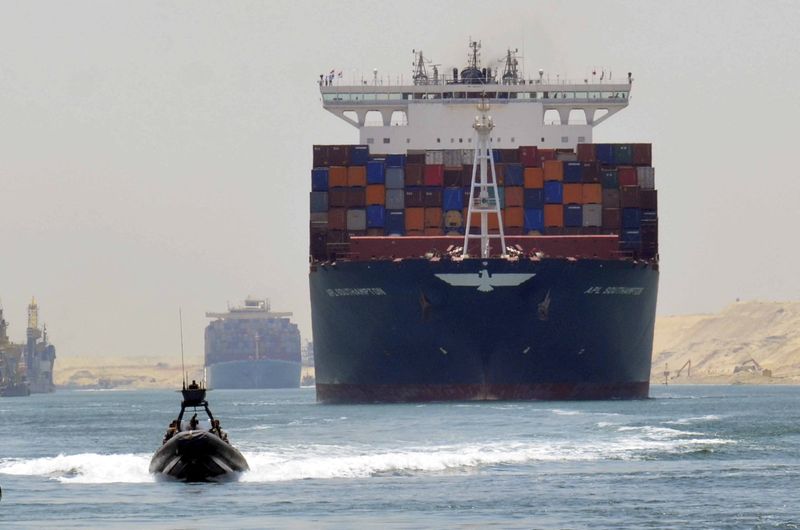Shipping industry in darkness over US-led Red Sea Navy By Reuters


© Reuters. FILE PHOTO: A cargo ship is seen crossing the New Suez Canal in Ismailia, Egypt, July 25, 2015. REUTERS/Stringer/File Photo
Jonathan Saul
LONDON (Reuters) – Shipping companies remain in the dark about the United States forming a new international naval coalition to combat Red Sea attacks, with many ships continuing to avoid the area or canceling contracts, sources said on Wednesday.
Sources, including shipping and maritime security officials, said few actual details were known about the plan Washington launched on Tuesday or whether it would participate directly in the event of further armed attacks at sea.
Yemen’s Iran-backed Houthi rebels have stepped up attacks on shipping in the Red Sea since November 19 in a show of support for Hamas amid the ongoing Israeli military offensive in the Gaza Strip.
Their leader said Wednesday the group would attack U.S. warships if they were targeted by Washington.
Houthi rebels used speedboats to fire missiles and launch maritime attacks on ships. The launched missile was repelled by an American warship.
“There are still many unknowns for the Allies. We do not know exactly how many warships will be involved, how long it will take for those ships to reach the area, what the rules of engagement will be and what the actual protection plans will be.” said Corey Ranslem, CEO of security firm Dryad Global.
“Globally, this is a fairly small area, but providing protection for commercial shipping in this area could become a significant undertaking depending on changes in Houthi tactics and the number of vessels.”
On November 19, Houthi commandos landed by helicopter on the car carrier Galaxy Leader and took them back to the port of Hodeidah in northern Yemen. The vessel and crew remain in custody.
The attack disrupted a key trade route linking Asia with Europe and North America through the Suez Canal and caused container shipping costs to rise sharply as companies sought to ship goods via alternative, often longer, routes.
Ranslem of Dryad said threats to commercial shipping were likely to continue as the war progressed.
“Many global shipping companies are redirecting around Africa or ceasing operations within the region entirely. If the coalition’s efforts are not effective, we expect more shipping companies to redirect around the Cape,” he said. .
Traffic through the narrow Bab al-Mandab Strait, which connects the Red Sea to the Gulf of Aden, was down 14% between December 15 and 19 compared to December 8 and 12, according to data from MarineTraffic, an AIS vessel tracking and maritime analytics provider. . .
U.S. Secretary of Defense Lloyd Austin visited Bahrain this week, home to the U.S. Navy’s headquarters in the Middle East, and said Bahrain, Britain, Canada, France, Italy, the Netherlands, Norway, Seychelles and Spain were involved in the incident. Red Sea Security Operations.
The group plans to conduct joint patrols in the southern Red Sea and the nearby Gulf of Aden.
One shipping industry official said, “Are we not going to take any other action other than knocking missiles out of the sky? Will that alone provide shipping companies with the coverage they need? “We don’t know yet,” he said.
“The mayor needs to see if there is success or concrete action,” another source said.
The International Chamber of Shipping said it expected the new task force would enable “a coordinated effort across multiple warships to provide a significant counterintelligence response.”
Red Sea sailings suspended
Container shipping companies in particular have continued to suspend sailings through the Red Sea and instead use routes around Africa, which increase travel times and costs. This has raised concerns about delivery delays and rising prices that could eventually trigger a new round of global inflation.
“We will continue to reroute all ships planned until December 31. We will then reassess the situation and make a decision,” a Hapag Lloyd of Germany spokesman said.
Another shipping industry source said some shipowners had canceled charters through the Red Sea citing ‘unsafe navigation’ or were demanding risk premiums on top of reimbursements for increased war risk insurance cover.
The U.S.-led joint naval force already exists, comprised of 39 countries and headquartered in Bahrain. According to its website, its main focus is “anti-drugs, anti-smuggling, suppressing piracy and encouraging regional cooperation.”
The new coalition will initially be led by the United States and Britain, and over time other member states “will be persuaded to do their part,” said Gary Northwood, a former British naval captain and consultant at maritime security firm MAST.
“So the industry is going to have to put this together,” said Northwood, who once commanded warships in the region.
“The rules of engagement will be structured so that the ships can defend the seas against land and air threats. The fight against Houthis on the coast is for other operations.”



